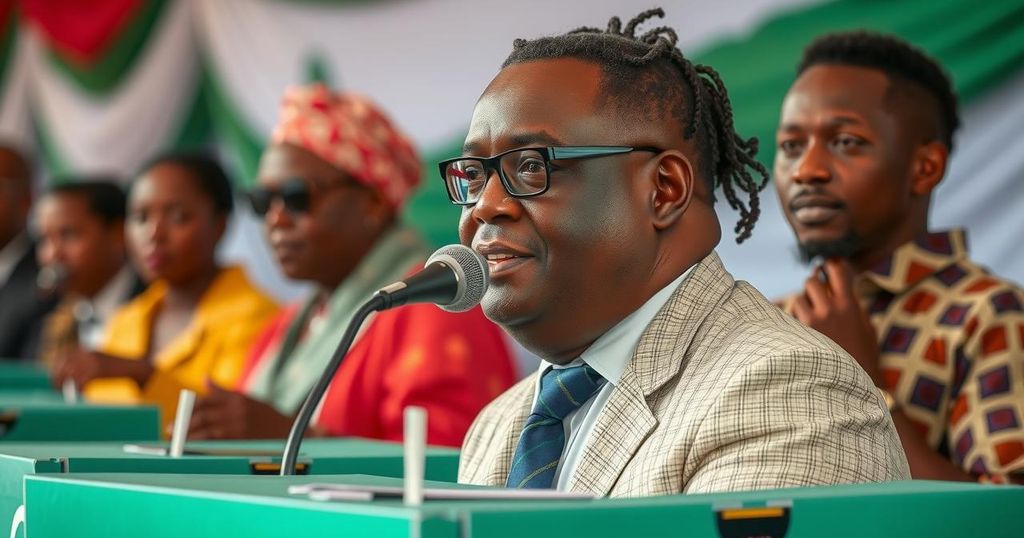Ghana’s presidential elections are set against a backdrop of economic turmoil, with Vice President Mahamudu Bawumia and former President John Mahama as leading contenders. Voters prioritize economic issues, including rising inflation and unemployment, as critical determinants in their decision-making process. The election outcome will substantially impact governance and potential economic policies moving forward in this West African nation.
On Saturday, Ghanaians prepare for a critical presidential election amidst an alarming economic crisis. Twelve candidates are on the ballot, but the contest primarily hinges on two significant figures: current Vice President Mahamudu Bawumia of the ruling New Patriotic Party (NPP) and former President John Mahama of the opposition National Democratic Congress (NDC). Polls reveal a closely divided electorate, reflecting concerns over the economy, which ranks as the foremost issue among voters, according to economist Godfred Bokpin.
Bawumia, who aspires to continue the economic policies of his predecessor, faces challenges stemming from rampant inflation, unemployment, and the environmental impact of illegal gold mining, widespread in the country. Despite efforts to combat illegal mining, environmental degradation persists, harming public trust in governance. In December 2022, Ghana shocked observers with an inflation rate of 54.1%, the highest in decades, leading to significant civil discontent.
As Ghana seeks recovery from the economic ramifications of the Covid-19 pandemic, rising poverty levels continue to plague the nation. The World Bank notes that weak growth, high food prices, and limited government expenditure contribute to deteriorating living standards, with over 1.3 million unemployed youths reported by September of the prior year. These economic adversities have intensified scrutiny of Bawumia’s record, with Mahama criticizing the administration’s lack of substantive economic discourse during the campaign.
The incumbent Vice President’s spokesperson admitted economic challenges exist, stating, “We haven’t had the best of days when it comes to the economy between 2020 and 2024.” In contrast, Mahama has pledged to implement a transparent government that fosters accountability, committing to stabilize the economy and reduce taxes rapidly if elected.
Bawumia advocates for digital economic strategies and stabilizing food prices, aiming to bolster his party’s position even amid prevailing economic woes. With more than half of Ghana’s 34 million citizens eligible to vote, the stakes remain high as popular demand for governmental change increases. The electoral process adheres to democratic principles, requiring a candidate to secure over 50% of votes to win outright. A runoff election will occur if no candidate meets this threshold.
In conclusion, as Ghana approaches this pivotal election, the conflict between economic visibility and voter preference for sustainable governance may dictate the political landscape’s trajectory. Observers, like Kwame Asah-Asante, express optimism that the elections will maintain Ghana’s tradition of peaceful transitions of power, emphasizing the populace’s desire for a government that addresses their needs effectively.
The imminent elections in Ghana occur against a backdrop of severe economic challenges, including unprecedented levels of inflation and unemployment. The country’s economy is still struggling to recover from the effects of the Covid-19 pandemic, which exacerbated poverty levels and weakened economic performance. This context reveals the weighty concerns that voters will take to the polls, particularly regarding the candidates’ promises to restore economic stability and address pressing social issues such as illegal mining and living costs.
The upcoming election is crucial for Ghana, as it reflects the electorate’s urgent call for economic reform and accountability within government structures. Candidates are focused on economic recovery, with Bawumia attempting to navigate the repercussions of his party’s governance amidst economic distress while Mahama positions himself as a reformative alternative. The future governance approach, based on the electoral outcome, may significantly influence the nation’s socioeconomic landscape and its democratic integrity.
Original Source: www.cnn.com






